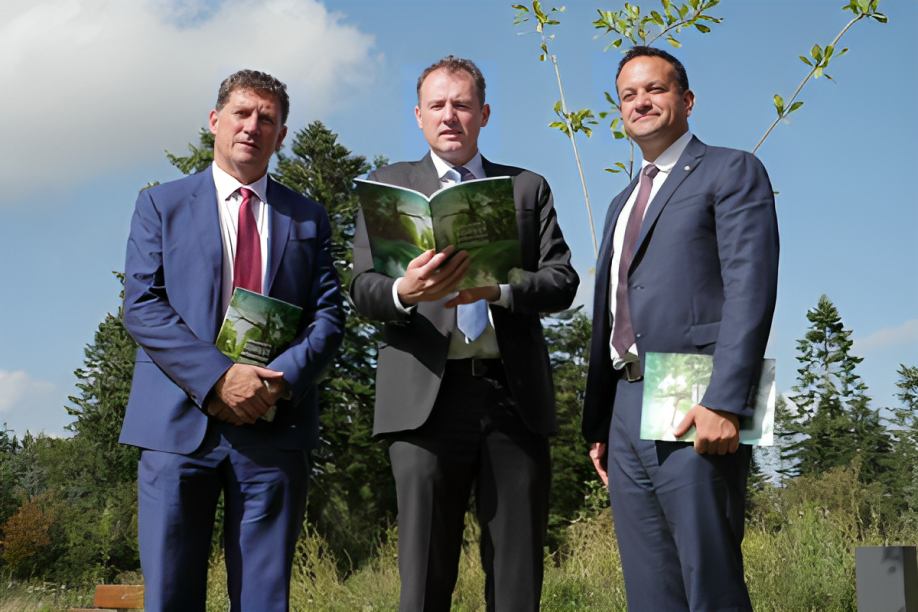Minister for Agriculture Food and the Marine, Charlie McConalogue TD, and Minister of State for Land-use and Biodiversity, Senator Pippa Hackett, welcomed the opening of the Afforestation Scheme under the new Forestry Programme 2023 – 2027.
Minister McConalogue said, “the new Forestry Programme was today approved by the Government, along with other non-Programme actions under the Forest Strategy Implementation Plan. I am delighted that we are now open to applications to plant trees and that we are announcing this in Avondale, the home of Irish forestry. This was the site of the first forestry school which was the genesis of forestry in Ireland. A continuation and growth ambition for that vision is what we are building on.”
“This is a most welcome development and will allow landowners the opportunity to play their part in creating forests that will benefit all of society for years to come. Vital to this success are farmers for it is they who own most of the land on which this increased planting will take place. That is why we are offering them five years of premiums more than non-farmers. Farmers can choose to plant on a large or small scale with this Programme providing a steady income stream for 20 years on farms.”
The Forest Strategy which covers the period to 2030 was published today and aims to significantly increase the diversity and range of our forests, with the objective of contributing to biodiversity, sustainability and climate change goals. The Forest Strategy Implementation Plan, which includes the Forestry Programme set out the actions which will realise the ambitions in the Forest Strategy.
Minister Hackett said, “since I took on this role in Government I have set about fixing many of the legacy issues that have plagued forestry in recent years. From tackling licensing delays to the creation of an entirely new forestry programme, we have spent three years transforming systems and policies so that farmers and landowners can interact and commit to forestry in confidence, knowing that it is the right choice for their land, for their family’s future and for the future of the planet.”
“In creating this new forestry programme, we have been conscious that we need to manage forested areas in a manner more sympathetic to nature, and communities, and that is what the new programme and strategy sets out to do. There are higher broadleaf requirements, greater setback distances and greater utilization of continuous cover management. This is also why the programme contains 12 forest types for which we will pay the costs of establishment and yearly premiums which in some cases are over €1,000 per hectare per year for up to 20 years. The Programme is underpinned by a Government commitment of €1.3 billion, making it the best-funded Forestry Programme in the history of the State.”
“To make this programme successful and get trees in the ground we had to balance economic, social, and environmental needs. We are changing what, where and how we plant so that we will have more diverse forests which are climate resilient and biodiversity friendly. Our aim is to encourage balanced planting between broadleaves and conifers. Our forests will continue to have many different functions – whether it is delivering for carbon sequestration and storage, homes of the future, supporting habitat creation, protecting waterways, delivering jobs, and providing important outdoor amenity spaces for our citizens and tourists alike. I don’t think any other sector can deliver so many positives for society and we are now on the right path to getting that balance correct.”
Other schemes under the Forestry Programme 2023 – 2027 have already opened, such as the Forest Roads Scheme, and more will be rolled – out in the weeks and months ahead. These will promote sustainable forest management, to protect and develop our forests, promoting close-to-nature methods, and supporting forest owners in making the most of their forestry asset.
While the Forestry Programme is the main implementation mechanism for the Forest Strategy in the immediate to short term, the Implementation Plan also contains a range of non-Programme actions which will assist in the development of the forest sector. These are under consideration and development and will very much complement actions under the Forestry Programme. For example the Timber Construction Steering Group which will be formed in the coming weeks and will address the importance of increasing the use of timber in construction, a key goal of the Forest Strategy.
Both Ministers indicated the success of forestry in Ireland would very much depend on a collaborative effort, between private, public and third actors. They asked for all interested in the future of forestry in Ireland to get behind this new vision for the sector and to show their support by communicating the many benefits of this new approach.



